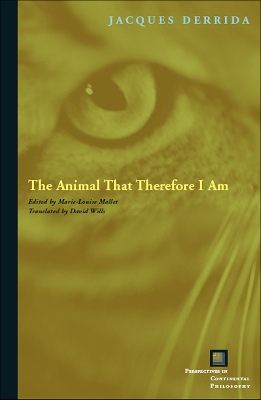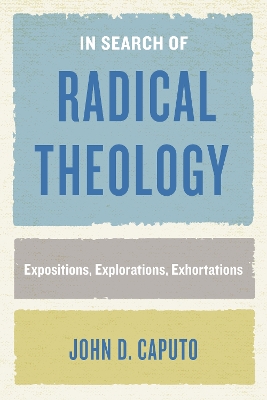Perspectives in Continental Philosophy
4 total works
The Animal That Therefore I Am is the long-awaited translation of the complete text of Jacques Derrida’s ten-hour address to the 1997 Cérisy conference entitled “The Autobiographical Animal,” the third of four such colloquia on his work. The book was assembled posthumously on the basis of two published sections, one written and recorded session, and one informal recorded session.
The book is at once an affectionate look back over the multiple roles played by animals in Derrida’s work and a profound philosophical investigation and critique of the relegation of animal life that takes place as a result of the distinction—dating from Descartes—between man as thinking animal and every other living species. That starts with the very fact of the line of separation drawn between the human and the millions of other species that are reduced to a single “the animal.” Derrida finds that distinction, or versions of it, surfacing in thinkers as far apart as Descartes, Kant, Heidegger, Lacan, and Levinas, and he dedicates extended analyses to
the question in the work of each of them.
The book’s autobiographical theme intersects with its philosophical analysis through the figures of looking and nakedness, staged in terms of Derrida’s experience when his cat follows him into the bathroom in the morning. In a classic deconstructive reversal, Derrida asks what this animal sees and thinks when it sees this naked man. Yet the experiences of nakedness and shame also lead all the way back into the mythologies of “man’s dominion over the beasts” and trace a history of how man has systematically displaced onto the animal his own failings or bêtises.
The Animal That Therefore I Am is at times a militant plea and indictment regarding, especially, the modern industrialized treatment of animals. However, Derrida cannot subscribe to a simplistic version of animal rights that fails to follow through, in all its implications, the questions and definitions of “life” to which he returned in much of his later work.
Responding to questions put to him at a Roundtable held at Villanova University in 1994, Jacques Derrida leads the reader through an illuminating discussion of the central themes of deconstruction. Speaking in English and extemporaneously, Derrida takes up with unusual clarity and great eloquence such topics as the task of philosophy, the Greeks, justice, responsibility, the gift, the community, the distinction between the messianic and the concrete messianisms, and his interpretation of James Joyce. Derrida convincingly refutes the charges of relativism and nihilism that are often leveled at deconstruction by its critics and sets forth the profoundly affirmative and ethico-political thrust of his work. The "Roundtable" is marked by the unusual clarity of Derrida's presentation and by the deep respect for the great works of the philosophical and literary tradition with which he characterizes his philosophical work.
The Roundtable is annotated by John D. Caputo, the David R. Cook Professor of Philosophy at Villanova University, who has supplied cross references to Derrida's writings where the reader may find further discussion on these topics. Professor Caputo has also supplied a commentary which elaborates the principal issues raised in the Roundtable.
In all, this volume represents one of the most lucid, compact and reliable introductions to Derrida and deconstruction available in any language. An ideal volume for students approaching Derrida for the first time, Deconstruction in a Nutshell will prove instructive and illuminating as well for those already familiar with Derrida's work.
Sovereignties in Question
by Jacques Derrida, Thomas Dutoit, and Outi Pasanen
Contents
* Shibboleth: For Paul Celan
* "A Self-Unsealing Poetic Text": Poetics and Politics of Witnessing
* Language Does Not Belong: An Interview
* The Majesty of the Present: Reading Celan's "The Meridian"
* Rams: Uninterrupted Dialogue-between Two Infinities, the Poem
This book brings together five powerful encounters. Themes central to all of
Derrida's writings thread the intense confrontation between the most famous
philosopher of our time and the Jewish poet writing in German who, perhaps
more powerfully than any other, has testified to the European experience of
the twentieth century.
They include the date or signature and its singularity; the notion of the trace;
temporal structures of futurity and the "to come"; the multiplicity of language
and questions of translation; such speech acts as testimony and promising, but
also lying and perjury; the possibility of the impossible; and, above all, the question
of the poem as addressed and destined beyond knowledge, seeking to speak to
and for the irreducibly other.
The memory of encounters with thinkers who have also engaged Celan's work
animates these writings, which include a brilliant dialogue between two
interpretative modes-hermeneutics and deconstruction. Derrida's approach to
a poem is a revelation on many levels, from the most concrete ways of reading
-for example, his analysis of a sequence of personal pronouns-to the most
sweeping imperatives of human existence (and Derrida's writings are always
a study in the imbrication of such levels). Above all, he voices the call to
responsibility in the ultimate line of Celan's poem: "The world is gone,
I must carry you," which sounds throughout the book's final essay like a refrain.
Only two of the texts in this volume do not appear here in English for the first time. Of these, Schibboleth has been entirely retranslated and has been set following Derrida's own instructions for publication in French; "A Self-Unsealing Poetic Text" was substantially rewritten by Derrida himself and basically appears here as the translation of a new text.
Jacques Derrida's most recent books in English translation include Counterpath: Traveling with Jacques Derrida (with Catherine Malabou). He died in Paris on October 8, 2004.
Thomas Dutoit teaches at the Universite de Paris 7. He translated Aporias and edited On the Name, both by Jacques Derrida.
This sparkling collection of essays invites readers to join a seasoned scholar on his journey to catch “radical theology” in action, both in the Church and our culture at large.
Capturing a career’s worth of thought and erudition, this rich volume treats readers to creative thought, careful argumentation, and sophisticated analysis transmitted through the lucid, accessible prose that has earned the author a wide readership of academics and non-academics alike. In tackling “radical theology,” John D. Caputo has in mind the deeper stream that courses its way through various historical and confessional theologies, upon which these theologies draw even while it disturbs them from within. They are well served by this disturbance because it keeps them on their toes. When we read about professional theologians’ losing their jobs in confessional institutions, the chances are that, by earnestly digging into what is going on in their tradition, they have hit upon radical theological rock.
Unlike modernist dismissals of religion, radical theology does not debunk but re-invents the theological tradition. Radical theology, Caputo says, is a double deconstruction—of supernatural theology on the one hand and of transcendental reason on the other, and therefore of the settled distinctions between the religious and the secular. Caputo also addresses the challenge for radical theology to earn a spot in the curriculum, given that the “radical” makes it suspect among the confessional seminaries while the “theology” renders it suspect among university seminars. Journeying from the academy to contemporary American culture, In Search of Radical Theology includes a captivating presentation of radical political theology for the time of Trump. This utterly unique volume not only brings readers on an enlightening tour of Caputo’s thought but also invites us to accompany the author as he travels into intriguing new territories.


